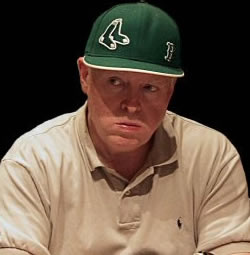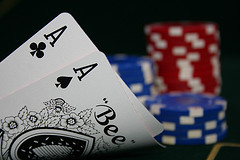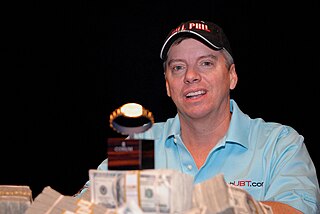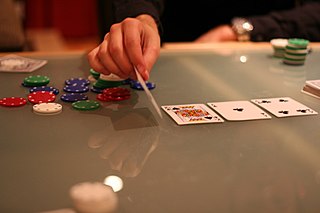In poker, pot odds are the ratio of the current size of the pot to the cost of a contemplated call. Pot odds are compared to the odds of winning a hand with a future card in order to estimate the call's expected value. The purpose of this is to statistically guide a player's decision between the options of call or fold. Raising is an alternative to place this decision on the opponent.

In the card game of poker, a bluff is a bet or raise made with a hand which is not thought to be the best hand. To bluff is to make such a bet. The objective of a bluff is to induce a fold by at least one opponent who holds a better hand. The size and frequency of a bluff determines its profitability to the bluffer. By extension, the phrase "calling somebody's bluff" is often used outside the context of poker to describe situations where one person demands that another proves a claim, or proves that they are not being deceptive.

Texas hold 'em is one of the most popular variants of the card game of poker. Two cards, known as hole cards, are dealt face down to each player, and then five community cards are dealt face up in three stages. The stages consist of a series of three cards, later an additional single card, and a final card. Each player seeks the best five-card poker hand from any combination of the seven cards: the five community cards and their two hole cards. Players have betting options to check, call, raise, or fold. Rounds of betting take place before the flop is dealt and after each subsequent deal. The player who has the best hand and has not folded by the end of all betting rounds wins all of the money bet for the hand, known as the pot. In certain situations, a "split pot" or "tie" can occur when two players have hands of equivalent value. This is also called "chop the pot". Texas hold 'em is also the H game featured in HORSE and HOSE.
Slow playing is a deceptive play in poker where a player bets weakly or passively with a strong holding. It is the opposite of fast playing. A flat call can be a form of slow playing. The objective of slow playing is to lure opponents into a pot who might fold to a raise, or to cause them to bet more strongly than they would if the player had played aggressively. Slow playing sacrifices protection against hands that may improve and risks losing the pot-building value of a bet if the opponent also checks.

David Sklansky is an American professional poker player and author. An early writer on poker strategy, he is known for his mathematical approach to the game. His key work The Theory of Poker presents fundamental principles on which much later analysis is based.

Dan Harrington is a professional poker player, best known for winning the Main Event at the 1995 World Series of Poker. He has earned one World Poker Tour title, two WSOP bracelets, and over six million dollars in tournament cashes in his poker career. He is also a member of the Poker Hall of Fame.

In Texas hold 'em, a starting hand consists of two hole cards, which belong solely to the player and remain hidden from the other players. Five community cards are also dealt into play. Betting begins before any of the community cards are exposed, and continues throughout the hand. The player's "playing hand", which will be compared against that of each competing player, is the best 5-card poker hand available from his two hole cards and the five community cards. Unless otherwise specified, here the term hand applies to the player's two hole cards, or starting hand.
Two Plus Two Publishing is a private company established and owned by statistician and poker player Mason Malmuth. The company publishes books on poker and gambling written by professionals in the field such as David Sklansky, Dan Harrington, Bill Robertie, Collin Moshman, Ed Miller, Ray Zee, Sunny Mehta, Alan Schoonmaker, William Jockusch, and Malmuth himself.
Mason Malmuth is an American poker player, and author of books on both poker and gambling. He is the owner of Two Plus Two Publishing, which publishes books and runs an online gambling discussion forum.

Ivo Donev is a Bulgarian, with Austrian passport, who is a professional chess and poker player.

Russell Aaron Boyd, commonly known as Dutch Boyd, is an American professional poker player from Culver City, California.

Blair Rodman is an American professional poker player, based in Las Vegas, Nevada.
William Gerard (Bill) Robertie is a backgammon, chess, and poker player, author and teacher. He is one of several backgammon players to have won the World Backgammon Championship twice. Besides the World Championship wins in Monte Carlo, Robertie's major tournament victories include Boston, Las Vegas, the New York Metro Open, the Bahamas Pro-Am (1993), Istanbul (1994) and the Isle of Man Super-Jackpot (1984). In chess, Robertie won the 1970 U.S. Speed Chess Championship.
Stewart Reuben is a British chess player, organiser, arbiter and author. He has also been a professional poker player, been called "one of Britain's foremost poker players" and "one of the best two or three players in England", and written several books on the topic.
Negative freeroll is a colloquialism when the only two outcomes of a situation are neutral, or negative; contrasted with a freeroll, where the only two outcomes are neutral or positive.
Sunny Mehta is an American hockey executive, data scientist, and former professional poker player, writer, options trader, and musician. Currently the Assistant General Manager and Head of Analytics for the Florida Panthers, he pioneered the first full-time analytics department in the National Hockey League as Director of Hockey Analytics for the New Jersey Devils. He is co-author of two bestselling poker strategy books.

Community card poker refers to any game of poker that uses community cards, which are cards dealt face up in the center of the table and shared by all players. In these games, each player is dealt an incomplete hand face down, which are then combined with the community cards to make a complete hand. The set of community cards is called the "board", and may be dealt in a simple line or arranged in a special pattern. Rules of each game determine how they may be combined with each player's private hand. The most popular community card game today is Texas hold 'em, originating sometime in the 1920s.

Harrington on Hold 'em is a series of poker books about poker strategy, particularly for Texas hold 'em poker tournaments. They were all written by Dan Harrington and Bill Robertie and published by Two Plus Two Publishing.
In poker, the Independent Chip Model (ICM), also known as the Malmuth–Harville method, is a mathematical model that approximates a player's overall equity in an incomplete tournament. David Harville first developed the model in a 1973 paper on horse racing; in 1987, Mason Malmuth independently rediscovered it for poker. In the ICM, all players have comparable skill, so that current stack sizes entirely determine the probability distribution for a player's final ranking. The model then approximates this probability distribution and computes expected prize money.









